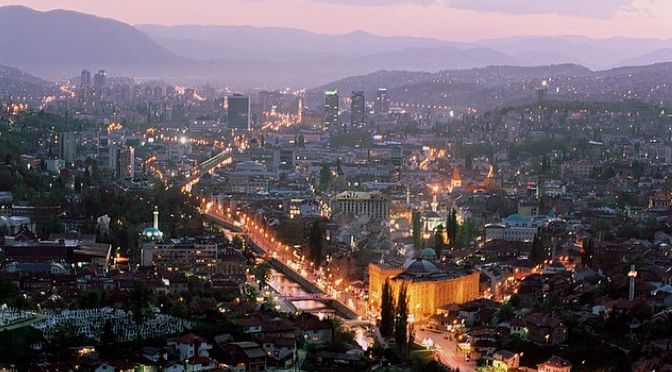A Bosnian Spring seemed to be breaking out. For days, people all over the country demonstrated against the government and called on public officials to quit.
But then the demonstrations turned dark. Buildings and roads burned. People and police officers were hurt. The archives in Bosnian institutions were in flames. The whole administrative system was about to collapse. In a highly bureaucratic country like Bosnia, the loss of documents means total collapse.
Unlike other places, these demonstrations are not redirected against a tyrant. People protest because they are hungry — they don’t have jobs. Officially, about 40 percent of Bosnians are unemployed. Many people over 30 years have never had even one day of official employment.
The reason for this dire situation is obvious. According to the Fraser Institute’s latest Economic Freedom of the World Report (PDF), for 2011 Bosnia ranked 91 out of 152 countries. It performs specifically bad in the area of size of government (122) and business regulation (120).
Starting a business is a nightmare in Bosnia. The costs are huge. To register a limited liability company requires almost three months’ average pay (average monthly net pay is €420), and after registering, one has to pay annual contributions of about a month’s average pay. On top of that, at least two people must be employed at a minimum gross salary of €300. Even volunteers cost the company money — the employer must pay a minimum of about €100 per month to the state. And as if that is not enough, a VAT needs to be paid before the seller receives any money from his customers.
But the biggest nightmare occurs when government inspectors visit your business. Tiny omissions can cost you a small fortune. In my neighborhood, a bakery closed down after an inspector found that the owner had failed to prepare a monthly summary of his employee turnover for the tax office, though he did send daily reports. The fine was €1,000, which the owner could not and did not want to pay. As a result, my neighborhood lost its bakery, and the owner and his family are back in the labor market competing with other people for the relatively few jobs available. Shops, bars, and other businesses are being closed because they marginally do not fit the prescribed space standards. This country with fewer than 4 million citizens has 65,000 blocked bank accounts for 40,000 companies. Companies owe the government more than €700 million in various taxes (PDF) (counting only companies owing more than €25,000).
The government’s cronyism has also created hardship, but unfortunately this has produced demands for more government intervention. For example, in Tuzla about 600 people accused the authorities of turning a blind eye to the collapse of a number of state firms after their privatization and demanded that the government save the companies to ensure these people’s continuous employment and salaries. Additionally, many unemployed people demand that the government create jobs for them, ensure all graduates employment, impose a one-person/one-job limit, provide universal health care, and generally create a better tomorrow. These are the standard impossible demand of socialists and communists. The only reasonable demand is to cut the pay of high-ranking politicians (it’s twice as high as in neighboring Serbia and up to 5 times higher than the average Bosnian’s income) and to simplify the bureaucracy.
The demonstrations all over Bosnia show that people have had enough of the current mess, but their demands show that they are on the wrong path to a solution. Should the politicians agree to these demands, we would have an even-more-onerous government. What Bosnia and Herzegovina needs has been identified by the great economist Ludwig von Mises: The way for underdeveloped nations to become richer is not through material aid. Prosperity is not simply a matter of capital investment. It is a spiritual, intellectual, and ideological matter. What the underdeveloped countries need first is the philosophy of economic freedom and private enterprise.
If we fail to achieve that, the demonstrations will not bring a better future for the Bosnian people, but a far worst future.
This piece was first published on AtlasOne
[Photo: Sarajevo, Bosnia. credit: EurasiaReview]


